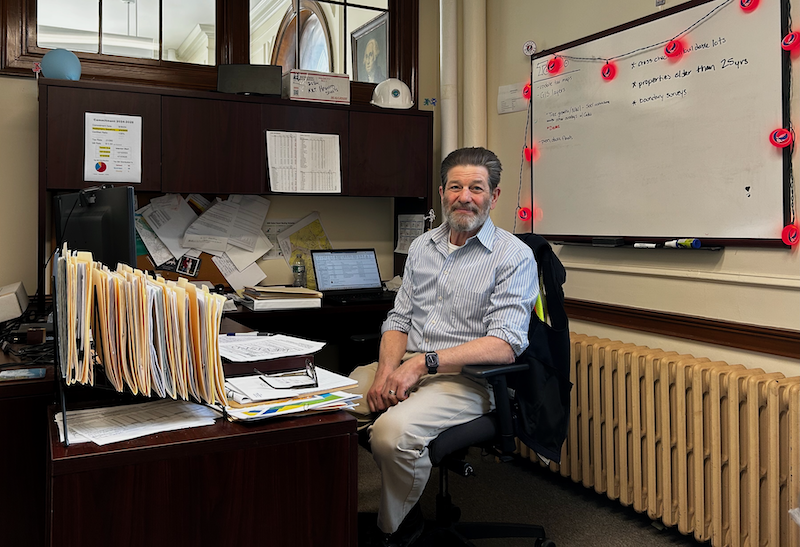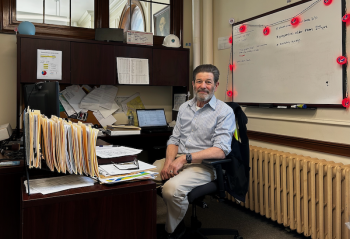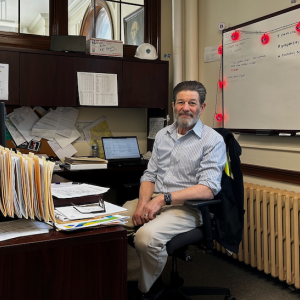Camden, Rockport assessor advocates for tax relief bills in Augusta
AUGUSTA — A series of proposed property tax relief bills, as well as multiple bills related to sales, excise and income, are currently under scrutiny in Augusta, as the Maine Legislature's Committee on Taxation reviews their merits, deciding which ones to amend and move forward, or let quietly slip away.
This year, in particular, the Office of the Revisor of Statutes received a number of bills submitted for the 132nd legislative session that are related to property tax relief. In large part, that is due to the effort of the Maine Municipal Association, the organization that advocates for cities and towns, to focus on property tax reform.
For Camden and Rockport Town Assessor Kerry Leichtman, advocating at the Capitol is the chance to reduce the tax burden on property owners. He has submitted written testimony on several proposed bills, such as LD 440, Resolve, to Study the Economic Effects of Instituting a Seasonal Sales Tax (he thinks it is a good idea), and LD 326, An Act to Increase the. Property Tax Exemption Provided to Individuals Who Are Legally Blind (he would rather increase the Homestead Exemption for all property owners across the board).
He supported a bill sponsored by Rep. Ann Matlack, D-St. George, LD 229: An Act to Bring Fairness in Income Taxes to Maine Families by Adjusting the Tax Brackets and Tax Rates, not as an assessor, but as a citizen, "a taxpaying resident of our great state," he wrote. "LD 229 takes a fair and balanced approach to income taxation."
Leichtman plans to drive over to Augusta and testify in person when bills concerning property tax are scheduled, including those introduced by MMA's Legislative Policy Committee (LPC). He and 69 other municipal officials — two from each Maine Senate district — sit on the LPC. The other Knox County official on that committee is Kara George, Thomaston Town Manager.
A subcommittee of the LPC, the Tax Reform Group, was formed this year to advocate for property tax relief. It is a substantial effort, given the complexities of Maine's tax code, and the competing interests for taxpayer money.
As assessor, Leichtman is acutely aware of how increases to municipal, school and county budgets directly affect the taxpayer. He is the one who sets the mil rate each summer, several months after voters decide at annual town meeting in June how they will spend their tax dollars to maintain the communities in which they live.
But it is a formula that he is constantly educating citizens about: Budget expenditures, whether for education, school buildings, police and fire departments, roads and opera house maintenance and multiple purposes determine the mil rate, and the mil rate determines how much a property owner will pay in annual property taxes.
Sales, excise and income taxes, by contrast, are collected by the state, and the Legislature sets the policies for how much of those revenues (revenue sharing) are returned to the municipalities. The less revenue sharing, the more the property owner is taxed to fund the local and regional budgets that the voters approve.
Reduce, reduce, reduce
The MMA's Tax Reform Working Group objectives are:
• Reduce the overall reliance on the property tax to fund services and programs. This includes providing municipalities with access to other dedicated revenue streams, including access to a modernized sales tax base.
•Reduce the erosion of the property tax base via the implementation of exemption programs, including BETE (business equipment tax exemption), BETR (business equipment tax reimbursements), current use, and leased hospital property.
• Reduce the over-reliance and the burdens the property tax places on resident single-family homeowners.
Maine's tax system has multiple opportunities to claim deductions, and for Leichtman, there are, "too many special exceptions, too many exemptions."
"Here’s one,” he said, pulling a sheet of paper from a pile on his desk. “LD, An Act to Eliminate the Excise Tax on Camper Trailers.”
If approved, that act will reduce revenue for the towns, he said.
“If you take revenue away from the towns, the mil rate has to go up to compensate," he said. (The bill was discussed Feb. 27 in a work session and was amended to retain the camper trailer tax but assess campers as the state assesses boats, based on length. The amended bill was sent out with an ought-to-pass.)
“And here is one that might be controversial, but I do not support it — An Act to Increase the Property Tax Exemption Provided to Individuals Who Are Legally Blind,” said Leichtman.
That exemption now is $4,000, “not very much,” he said, because it is a $4,000 reduction on the real estate assessment, not a $4,000 deduction on property taxes, “so the actual dollars are very few.”
“We do not do that for people who are deaf,” he said. “We do not do it for people who are paraplegics. We do not do it for a lot of other types of disabilities that could use some help.”
Some exemptions need a review, he said, pointing to the Farmland Current Use program, which he considers valuable to the state, but over-expanded.
“When the value of land goes so high that it does not pay to farm, you have to do something to bring the value of that land down, because we need food,” he said.
But, he said, if acreage is placed under Farmland, which is a classification that reduces the assessed value on land used for crops or horticulture, not only the agricultural fields get included, but any adjacent woods on the property, as well. That is despite the woods remaining uncultivated or farmed.
In January, Leichtman suggested to the Taxation Committee that it assemble a study group to analyze exemptions and current use, “not for eliminating the programs, but eliminating the abuses,” he said.
Did they warm to the idea?
“They did not react at all,” said Leichtman.
Solutions
Leichtman distinguishes between bills that offer indirect relief, such as LD 283, An Act to Expand Local Revenues by Including Meals and Lodging Sales Tax Revenue Under the the State Municipal Revenue Sharing Program, and bills that directly affect how much money a property owner is paying in property taxes, such as LD 140, An Act to Incrementally Increase the Homestead Property Tax Exemption.
“An example of direct relief is increasing the Homestead Exemption (HEX); an example of indirect relief is increasing the state’s reimbursement percentage for the homestead to municipalities," wrote Leichtman, in a letter he sent to citizens interested in keeping informed about his legislative efforts. "To explain: the HEX reduces your property’s taxable value by $25,000. It also reduces the town’s taxable value by $25,000 for each exemption granted.
“The state reimburses the towns for a percentage of the loss. Currently the state Constitution requires the state reimburse us a minimum of 50%. By that math, for every HEX issued we lose $12,500. Any loss of revenue increases the mil rate. We did have a program in place where the reimbursement increased by 3% each year until it reached 100%, but that got frozen at its current level of 76%.”
Leichtman and the Tax Reform Group want to see an increase in the Homestead exemption this year, but they are cautious. For instance, they support An Act to Incrementally Increase the Homestead Property Tax Exemption, which is sponsored by Senator Joe Baldacci, of Penobscot County. But their support comes with caveats.
The bill's summary said it would, for property tax years beginning on or after April 1, 2026, increase the homestead property tax exemption by $10,000 of the just value of the homestead each property tax year until the total exemption reaches $95,000. In subsequent property tax years, the exemption amount would be adjusted annually for inflation.
But the Tax Reform Group wants changes: “The most important of which is the reimbursement to towns. The bill does not specify the level of reimbursement. At 50 percent, it is a shell game; the taxpayer thinks they are getting a great break but because the town is funding the break, the money goes in one pocket and out the other.”
The LPC has introduced two bills regarding the homestead.
One proposes a Constitutional amendment that increases the exemption to no less than $50,000 and increases the reimbursement to no less than 90%.
The other bill reinstates the incremental increase in the reimbursement that, "we had to trade away in exchange for the elimination of the stabilization program. That incremental increase had the reimbursement rising by 3% each year until it reached 100%. This is also an example of our short-term and long-term strategies. The incremental increase bill will provide for immediate relief, the Constitutional amendment bill represents long-term systemic change."
"By setting mininums but not maximums, the Legislature can make the program more generous withoug having to amend the Constitution," wrote Leichtman, in a his letter.
Bigger visions
If Leichtman had his way, he would like MMA to advocate for shifting state-mandated programs and institutions, such as education and jails, away from their dependence on property taxes, and onto the state income tax.
He reasons that because the state requies what comprises essential program and services for schools, and how county jails are managed, then those costs should be born by the entire state.
"So if the state is dictating, they should pay for it," he said. "It should not come out of property tax. It should come out of income tax."
And income tax is a more progressive tax, he said.
"People who can better afford to pay, can pay a little more," said Leichtman. "It would instantly lower everybody's property tax bill."
This week, two bills due for a March 12 public hearing caught his eye:
LD 632: An Act to Allow a Local Option Sales Tax on Short-term Lodging to Fund Affordable Housing. It would allow a municipality to impose a local option sales tax of 2% on short-term lodging subject to the state sales and use tax if approved by referendum of the voters in that municipality. The revenue from the local option sales tax must be distributed to the municipality imposing the local option sales tax. The distributed revenue must be used in municipal programs for affordable housing in that municipality, including rental assistance for lower income households or moderate income households or to support the costs to municipalities for providing general assistance.
Leichtman is not favoring that one, but he plans to support LD 746: An Act to Authorize a Local Option Sales Tax on Short-term Lodging to Fund Municipalities and Affordable Housing. Like LD 632, it would allows a municipality to impose a local option sales tax of 2% on short-term lodging that is subject to the state sales tax if approved by referendum of the voters in that municipality. Ten percent of the revenue from the local option sales tax must be transferred to the Maine State Housing Authority to be used to provide subsidies through the rural affordable rental housing program or through another program that supports the development of affordable housing in rural communities and the balance distributed to the municipality imposing the local option sales tax.
He distinguishes between the two: "Both bills fall under the indirect tax relief category. By increasing a municipality’s revenue from a source other than property taxes, it should allow for less pressure on the mil rate. The difference between the two bills is LD 632 limits how municipalities can use the revenue, while LD 746 does not."
Bipartisan effort
Partisan debate is noticeably absent on MMA's 70-member LPC, said Leichtman, who has served on the committee for six years.
"I could not tell you who the Republicans and Democrats are," he said. "There are no partisan debates. They are all about how can we most economically and efficiently serve our constituencies."
The LPC is hoping to get all the homestead exemption related bills together to assess them all, "and knit a better bill," said Leichtman.
In the meantime, his message to his municipalities of Camden and Rockport is to keep spending down.
On the state level, he wants to keep reviewing ideas for tax relief, and continue the LPC's conversations about how to mitigate the tax burden in a sparsely populated state that is not rich.
"We have to be more creative in how we do it," he said.
Reach Editorial Director Lynda Clancy at lyndaclancy@penbaypilot.com





























